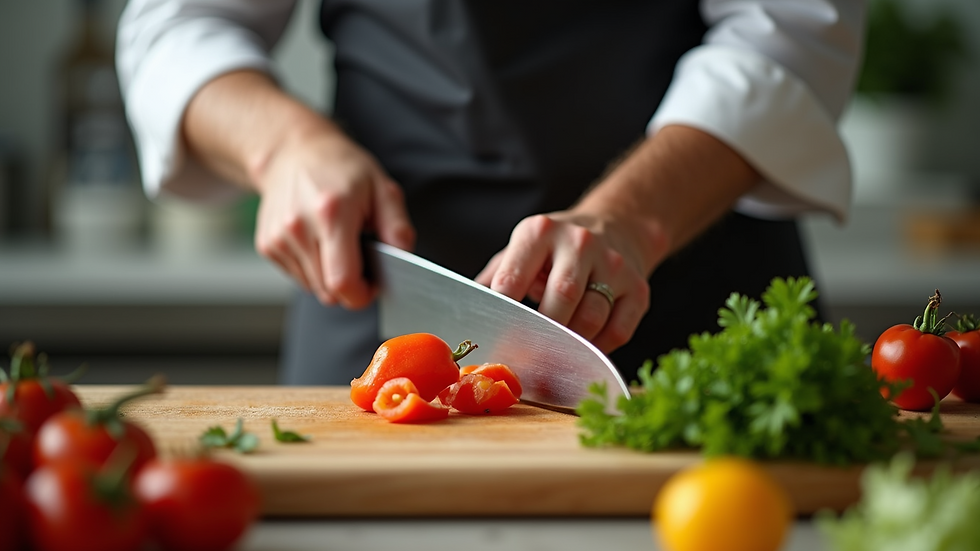Mastering the Art of Cooking with Simple Tips
- Nageen Roy

- Jul 15, 2025
- 4 min read
Cooking is an essential life skill that not only nourishes our bodies but can also be an enjoyable and creative outlet. Whether you're a seasoned chef or a beginner in the kitchen, mastering the art of cooking can seem like a daunting task. However, with some easy cooking advice, you can enhance your culinary skills and create delicious meals with confidence.
Easy Cooking Advice
To become proficient in cooking, it's essential to build a strong foundation. Here are some simple yet effective tips to get you started:
Invest in Quality Tools: Having the right kitchen tools can make a significant difference in your cooking experience. Invest in a sharp chef's knife, a cutting board, measuring cups, and a set of pans. Quality tools can save you time and make cooking more enjoyable.
If you're looking for some quality tools join my Facebook Page Bmore Cuisine. I frequently post Amazon finds that I have in my kitchen.
Understand Flavor Profiles: Familiarizing yourself with flavors is crucial. Different ingredients work well together; for example, basil complements tomatoes, while garlic enhances the taste of nearly any dish. Experimenting with herbs and spices can elevate your cooking.
Practice Food Safety: Always prioritize safety in the kitchen. Wash your hands, keep raw meats separate from other foods, and ensure that you cook foods to their recommended temperatures. This not only makes your meals safer but also prevents cross-contamination.

What Are Some Tips for Cooking?
Every cook needs a collection of tips that will make the process smoother and more enjoyable. Here are some of the best pieces of advice for cooking effectively:
Preparation is Key: Before you start cooking, read through the recipe and gather all the ingredients. This "mise en place" approach will save you time and reduce stress while cooking.
Make Use of Leftovers: Get creative with your leftovers. For example, roast vegetables from last night's dinner can be turned into a hearty soup or blended into a sauce. This not only reduces food waste but also transforms your previous meals into new delights.
Embrace the Power of Seasoning: Proper seasoning can transform a bland dish into something extraordinary. Don't shy away from salt, but use it wisely. Adding acidity, such as lemon juice or vinegar, also brightens flavors.

Cook in Batches: Preparing larger quantities of food and freezing portions can save you time on busy days. Soups, stews, and casseroles are particularly ideal for batch cooking.
Experiment with Cooking Techniques: Don’t limit yourself to one method of cooking. Grilling, roasting, steaming, and sautéing all bring different flavors and textures to food. Try them all and find what you enjoy.

Mindful Cooking
Cooking should be a mindful practice. Taking the time to appreciate the process can enhance your appreciation for food. Here are tips to cultivate mindfulness in the kitchen:
Savor the Preparation: Spend time chopping vegetables or stirring sauces. Focus on the textures and aromas as you work. This will not only improve your skills but also make cooking a more enjoyable experience.
Engage Your Senses: As you cook, pay attention to the sounds of sizzling, the scents of herbs, and the colors of fresh ingredients. This engagement can turn a mundane task into a joyful experience.
Clear Your Space: A clutter-free kitchen promotes better focus and creativity. Make sure to clean as you go, which will result in an organized cooking area that invites inspiration.
Building Your Culinary Skills
As you grow more confident in the kitchen, consider these strategies to elevate your cooking skills further:
Take Cooking Classes: Community centers and cooking schools often offer classes for different skill levels. This is a great way to learn new techniques and meet fellow cooking enthusiasts.
Some of my favorite cooking classes located in Baltimore are:
Watch Cooking Shows or YouTube Channels: Visual learners can benefit from watching experienced chefs. There are many resources available online that provide step-by-step instructions and tips on various cuisines.
The shows I love watching are: Master Chef Junior (if a kid can do it so can you), secret chef (they give you some helpful tips), and just follow a bunch of people on Instagram.
Use a Recipe Book: Invest in a good cookbook that aligns with your interests, whether it's baking, grilling, or vegetarian cooking. Having a variety of recipes at your fingertips offers endless opportunities to try new dishes.
Staying Inspired in the Kitchen
Maintaining motivation to cook every day can be challenging. Here are some tips to keep you inspired:
Create a Meal Plan: Planning your meals for the week not only saves time but also sparks creativity. By selecting diverse recipes, you challenge yourself to try new cuisines and ingredients.
Engage with Food Communities: Join local or online cooking groups. Sharing your successes and challenges with others can inspire you to try new things and keep your cooking journey exciting.
Experiment with Food Photography: Presenting food beautifully can add to the joy of cooking. Practice plating techniques and take pictures of your results. This can encourage you to keep improving as you showcase your creations.
Final Thoughts
Cooking is a valuable skill that can be mastered over time with practice and patience. By applying these easy cooking advice and practical tips, you can transform your culinary experience. Don't forget to explore different methods, flavors, and presentation styles to keep things exciting in the kitchen.
Remember, the joy of cooking comes not just from the result but also from the process. Embrace each step with curiosity and creativity, and you'll find yourself not only cooking better but enjoying every moment spent in your kitchen. For more cooking tips, explore useful resources like Bmore Cuisine.
Happy cooking!




Comments